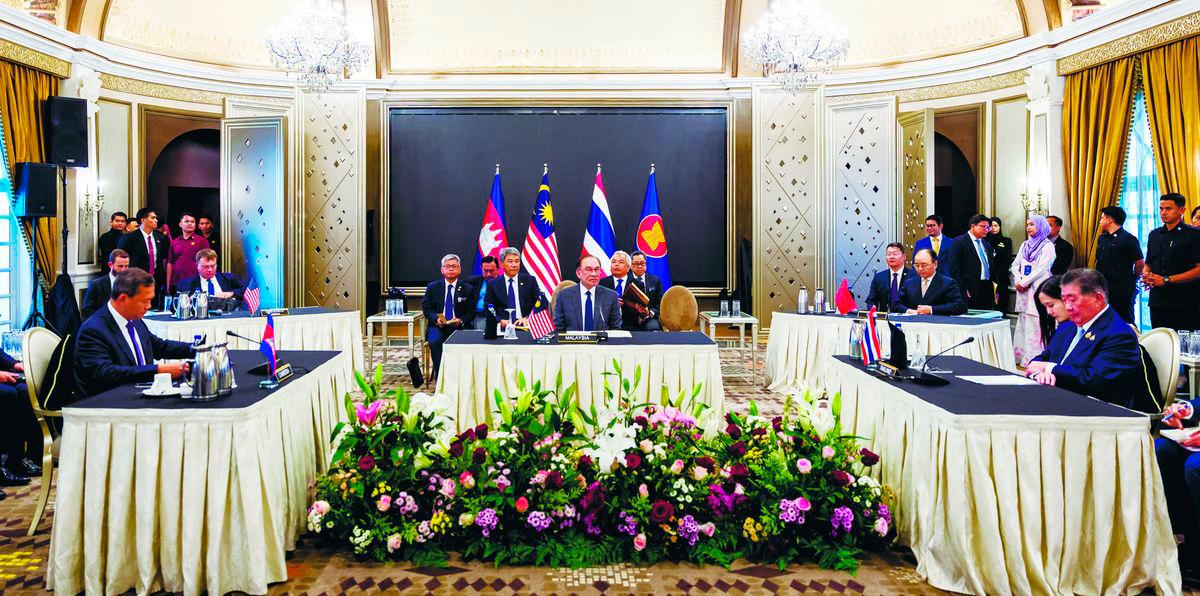PETALING JAYA: In a major diplomatic breakthrough, Cambodia and Thailand have agreed to an immediate and unconditional ceasefire, which took effect last night following a high-level special meeting in Putrajaya chaired by Prime Minister Datuk Seri Anwar Ibrahim.
The meeting brought together Cambodian Prime Minister Samdech Moha Borvor Thipadei Hun Manet and Thailand’s Acting Prime Minister Phumtham Wechayachai, and was co-organised by the United States with active participation from China – signalling broad international commitment to de-escalating tensions along the Cambodian-Thai border.
Anwar said both leaders expressed readiness to restore calm and return to normalcy.
“The ceasefire will take effect at 00:00 hours (local time) on July 28, 2025 (yesterday), marking what all parties described as a ‘vital first step’ towards restoring peace and stability in the region,” he said at a joint press conference.
To reinforce the truce, both sides agreed to:
> Hold informal talks between regional military commanders at 7am today;
> Convene a meeting of defence attachés, led by the Asean chair, pending mutual agreement; and
> Organise a General Border Committee (GBC) meeting on 4 August, to be hosted by Cambodia.
Anwar said Malaysia, as the Asean chair, had offered to coordinate an independent observer team to verify the implementation of the ceasefire.
“Malaysia will also consult with fellow Asean member states to participate in the observation effort, reflecting a regional commitment to supporting peace on the ground.
“Both sides have also agreed to resume direct communications between the prime ministers, foreign ministers and defence ministers of both countries,” he added.
Foreign and defence ministers from Malaysia, Cambodia and Thailand have been tasked with developing a comprehensive mechanism for ceasefire implementation, monitoring and reporting, a move seen as crucial for long-term stability.
Anwar noted that US President Donald J. Trump had contacted the leaders of both countries, urging a peaceful resolution to the conflict. He added that China had also maintained close dialogue with Cambodia, Thailand, Malaysia and other relevant nations to promote ceasefire and peace.
“The meeting reaffirms the shared resolve of Malaysia, Cambodia and Thailand to uphold the principles of international law, peaceful co-existence and multilateral cooperation in pursuit of a just and lasting resolution,” he said.
At the same press conference, Hun Manet confirmed that Cambodia and Thailand had reached a ceasefire agreement during the special meeting hosted by Malaysia.
“Today, we had a very good meeting and positive results. We hope this agreement will stop the fighting immediately — fighting that has cost lives and forced the displacement of nearly 300,000 people,” he said.
He reported that 140,000 people had been displaced in Cambodia as a result of the clashes, while Thailand had recorded 160,000 displaced persons.
Hun Manet said the ceasefire, along with a roadmap for military coordination and further diplomatic engagements, would pave the way for both countries to resume bilateral dialogue and de-escalate tensions along their shared border.
He thanked Anwar for convening what he described as “a timely meeting” and praised Malaysia’s role in mediating between the two Asean neighbours.
“I am also grateful to the US and China for playing constructive roles in helping to bring an end to the skirmishes,” he added, while commending the “positive role” of his Thai counterpart, Phumtham Wechayachai, in reaching the ceasefire.
Wechayachai likewise thanked the governments of Malaysia, the US and China for facilitating a peaceful outcome.
“Thailand is committed to a peaceful resolution that protects our sovereignty and the lives of our people,” he said.
As guns fall silent along the contested border, regional attention now shifts to ensuring the ceasefire holds and lays the groundwork for a durable and just resolution.









